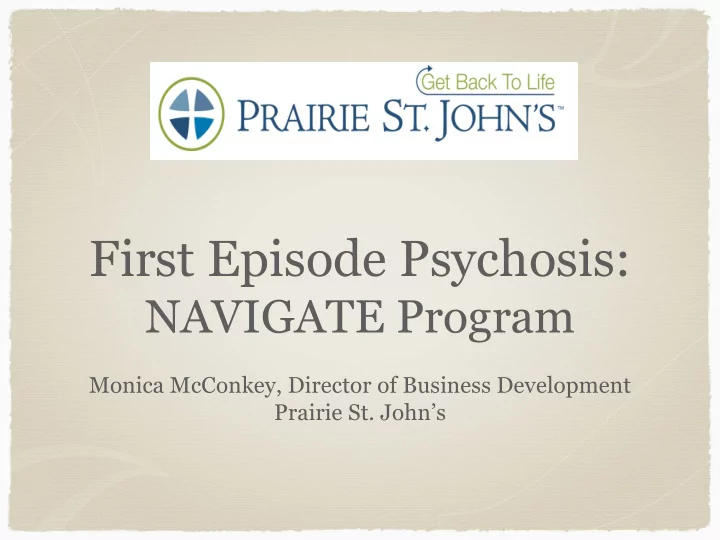

First Episode Psychosis: NAVIGATE Program Monica McConkey, Director of Business Development Prairie St. John’s
What is Psychosis? What Is Psychosis? A condition in the brain that affects a person's ability to know what is real vs. what is not real.
Prevalence Approximately 1% of all people in the world have schizophrenia Approximately 1.1% of the people in the US (3.2 million) are diagnosed or have the disorder. (NIMH) About 3% of all people will experience psychosis at some point in their lives. FM Area (pop 250,000)– 7,500 Approximately 100,000 adolescents and young adults in the US experience First Episode Psychosis each year. *Ra1SE NIMH August 2015) Peak Onset - 15-25 years of age
What happens… Prodromal Phase – onset of symptoms, ‘something seems a bit different’ can be subtle and look like a minimal change. Acute Phase – characteristic symptoms are most noticeable – typically when treatment begins. (First Episode Psychosis) Recovery/Residual Phase – less intense symptoms but symptoms may linger into recovery phase
Early Intervention is Key Research has shown the benefits of seeking treatment as early as possible after symptoms appear "Critical period" for optimal treatment is within the first year Reduced secondary problems and work/school disruption Retention of social skills and support Decreased need for hospitalization More rapid recovery and better prognosis Reduced family disruption and distress Less treatment resistance, lower risk of relapse
NAVIGATE Comprehensive, evidenced based, program designed to provide early and effective treatment to individuals who have experienced a first episode of psychosis SAMHSA approved option for implementing Coordinated Specialty Care (CSC) for early psychosis
NAVIGATE Team -Program Director -Medical/Prescriber -Individual Resiliency Trainer (IRT) - who helps individuals identify and work towards their goals, teaching them strategies and skills to build their resiliency in coping with psychosis while staying on track with their lives -Family Educator -Case Manager - Community Options to assist/direct educational and/or employment goals (school and employer assist)
Referral Process Referrals – The Clinic @ Prairie St. John’s ü Internal ü External Initial Meeting Appointments Scheduled Referral to Community Options
Data 10 individuals served in program to date All 10 - males between ages of 14 and 23 Length of stay – range from 10 months to single appts Referral sources: Sanford, SEHSC, NDSU, PSJ Diagnoses included: Schizophrenia, First Episode ü Major Depressive Disorder, psychotic Disorder, monitor for Schizoaffective ü disorder, Generalized Anxiety Schizoaffective disorder, bipolar type, Autism spectrum ü Schizophreniform disorder ü Schizoaffective disorder, bipolar disorder, meth and cannabis abuse ü Mood disorder, Anxiety disorder, Psychotic disorder, Cannabis and alcohol ü abuse
Lessons Learned Need for NAVIGATE training 1. Need for designated staff 2. Tele-psychiatry challenges 3. Difficulty with outcome measurements 4.
Questions?
Recommend
More recommend